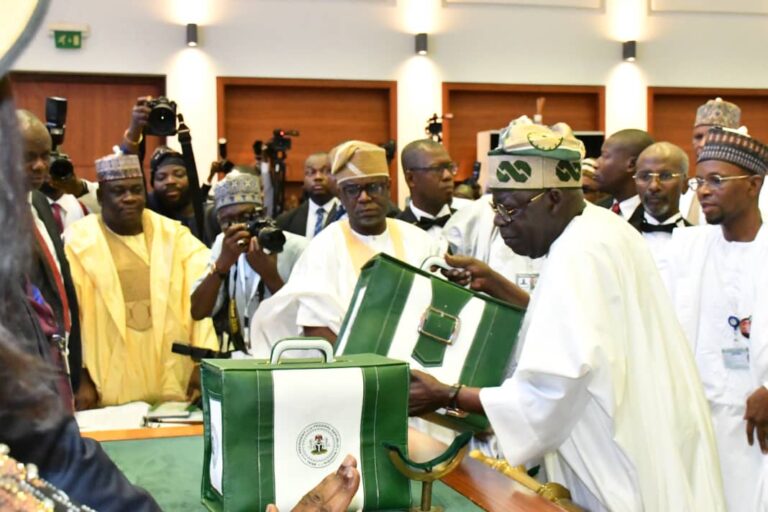- N38.3bn Allocation To President, VP Residences In Abuja, Lagos
- Highlights Alarming Issues, Discrepancies, Seeks Urgent Review Of 2024 Budget
BudgIT, a leading civic-tech organization promoting transparency, accountability, and effective service delivery in Nigeria, on Monday raised concerns over the proposed 2024 Appropriation Bill presented to the National Assembly by President Bola Ahmed Tinubu, expressing worry over the 2,116% exponential growth in service-wide vote since 2018.
Service-wide vote, which according to BudgIT in a statement by Nancy Odimegwu, its Communications Associate, is a contingency fund to address unforeseen circumstances and events, has grown from N198.95bn in 2018, representing 2.18% of that year’s budget, to N757.19bn or 5.54% of the 2021 budget
In the proposed 2024 budget now under consideration by the federal legislators, the figure spiked to N4.41tr, or 16.03% of next year’s budget, which it said is worrying, especially as it contains “budget lines that should be captured within MDAs’ budgets and vague budget lines that create loopholes for impropriety and/or corruption.”
For example, according to the statement, “the service-wide vote envelope in the 2024 Appropriation Bill contains N108bn for “special projects” with the project code “ERGP9213044.
“To worsen the situation, the federal government budget implementation reports often contain no information on how service-wide votes are utilized,” the statement added.
BudgIT also drew attention to duplications in allocations, particularly for renovation of the President’s and Vice President’s quarters, for which the Federal Government made provisions of N4bn each in the 2023 supplementary budget for renovating the President’s official quarters in Aso Rock Villa and Dodan Barracks.
There is however, surprisingly, another N500m allocation to renovate the same President’s quarters in Aso Rock Villa, even as N5bn has been earmarked for the renovation of the President’s quarters in Dodan Barracks; while the Vice President’s quarters in Lagos and Abuja, which got a cumulative sum of N5.5bn in the 2023 supplementary budget for renovation, has equally been allocated N4bn, N300 million, and N5bn each in the 2024 budget.
Cumulatively, therefore, the President and Vice President have a total allocation of N28.3bn to either renovate or construct their quarters in Lagos and Abuja, and another N10bn to digitize those quarters.
“For better context, the funds set aside to renovate, construct, and digitalize the official residences of the President and Vice President are more than the capital budget of the Ministry of Solid Minerals Development and the Ministry of Steel Development put together,” the statement added.
This is even more worrisome, BudgIT stressed, because the Federal Government plans to borrow $7.8bn and €100m (an estimated N6tr) to fund the Medium-Term Expenditure Framework (MTEF) which runs till 2026.
There are also reservations around the revenue projections which have generally been ambitious and unmet over the year even in aggregate, following which BudgIT noted the need to align the revenue projections in the budget with fiscal realities. This, it said, must be done realistically and pragmatically at a time net oil revenue has been falling on the average over the last three years.
With oil revenue now a generally unreliable source of government revenue, the organisation urged the Nigerian government to redirects its focus beyond customs revenues and value-added taxes.
BudgIT, therefore, urged the National Assembly to recognize the pivotal role of the budget as a government policy instrument and conduct a thorough examination, which requires a comprehensive review while prioritizing “broad-based economic growth, reduces inequality, addresses poverty, tackles insecurity, bridges Nigeria’s infrastructure gap, and invests in human capital development.”
A further review of the proposed 2024 Appropriation Bill breakdown, showed according to BudgIT that the Bola Ahmed Tinubu administration is continuing with some deleterious budget practices from previous regimes that have fostered corruption, underdevelopment, unemployment, and multidimensional poverty, like the absence of crucial budget breakdowns from the National Assembly, Government-Owned Enterprises, and some Ministry Departments and Agencies in the 2024 budget proposal.
For instance, it continued, “there is no breakdown of the National Assembly, the Niger Delta Development Commission and the North East Development Commission’s budget.
“For emphasis, the budgets of key revenue-generating government entities—including the Nigeria Ports Authority, Nigeria Customs Service, Nigerian Maritime Administration and Safety Agency (NiMASA), National Petroleum Investment Management Services (NAPIMS), Nigerian Security Printing and Minting Plc (NSPM), to mention a few—are conspicuously missing from the proposed 2024 budget presented to the National Assembly,” it lamented further.
“Furthermore, the proposed budget’s total sum is N24.08 trillion, indicating a discrepancy of N3.42 trillion compared to the N27.5 trillion aggregate budget presented. We suspect that the difference above comprises the aggregate budgets of the Government-Owned Enterprises. To this effect, the Government-Owned Enterprises’ proposed revenue and expenditures require disaggregation. The revenues and expenditures of several Government-Owned Enterprises have historically been absent from formal budget presentations,” it added.








